We’re seated in the Badwater Saloon in Death Valley National Park: Duke Mosley, Shannon Ellis, Jeff Gambrell, Rick Yelverton, and me. Rick starts the 2021 Badwater 135 in five hours, and the rest of us will crew and pace him from a jam-packed minivan. Rick picks at a burger and fries, gamely tries to explain why a 63-year-old chooses a challenge like this, and whether his age will hamper or benefit his performance.
This article comprises a pre-race interview, a description of Rick’s 2021 Badwater 135 race, and a post-race interview. Rick’s responses have been edited for length and clarity.
iRunFar: You’re a 63-year-old surgeon from Mississippi with a loving family. Why do you want to run 135 miles on the road through Death Valley in temperatures above 115 degrees Fahrenheit?
Rick Yelverton: I don’t have a real good answer, but it started a long time ago when I was doing Ironman races, and I read Dean Karnazes’s book, Ultramarathon Man. I got to the chapter about Badwater and the race sounded awful and dangerous, but I kept thinking about it. At first it was a curiosity, but then somehow, it became more of an obsession. I kind of put it on the back-burner for a while though. I figured I could do it when I got older. Then I met Duke [Mosley] at an event at the hospital, and he had this Badwater sticker on his laptop. People told me he was an ultrarunner, and meeting him was what pulled the trigger. I said, “I’m going to do this ultrarunning thing.”
iRunFar: Why did you put off ultrarunning until you got older?
Yelverton: I figured I’d be slow, but I thought maybe I could keep going, and everything I’d read said ultrarunners were an older bunch. I did my first ultra when I was still doing Ironman events. I did a 50 miler when I was 52 or 53 years old.
iRunFar: Did Badwater become an obsession? Was it because it sounded like an incredible feat to you personally, or because you knew it would sound like an incredible feat to other people?
Yelverton: I’ve been in recovery from alcohol addiction for many years, so it’s probably part of my nature — doing things to an extreme.
iRunFar: What were you doing before you started racing Ironman distance triathlons at age 47?
Yelverton: Nothing. I didn’t play sports in high school or college. I hated sports. I went to a small school in Mississippi, and they made us play football. I was little bitty. I remember getting hit so hard my helmet spun around.
iRunFar: I think you’re the third-oldest runner at Badwater this year. How do you feel about that?
Yelverton: I don’t like being old. I’m having a hard time being this old.
iRunFar: Does being older than most of the runners make you worry about your chances of finishing?
Yelverton: I don’t think too much about it. I try to trust my training.
iRunFar: What was the hardest part of your training?
Yelverton: The hardest part was doing all the things together at the end: the heat training plus the running plus the treadmill climbing plus the yoga. When I sat down and started figuring it out, it was three to four hours a day of training. I hadn’t dedicated that much time to training up to this point, and work often made that impossible. My work life has just been chaos here lately. The one thing I did religiously was the sauna and the climbing. So the hardest part of training was the time factor. [Author’s Note: Rick spent 90 minutes a day in the sauna at work during the last week of his Badwater training, building up to that time over the month before the race. There aren’t many hills where he lives in Mississippi, so he hiked on the treadmill at 15% grade to prepare for the climbing on the course.]
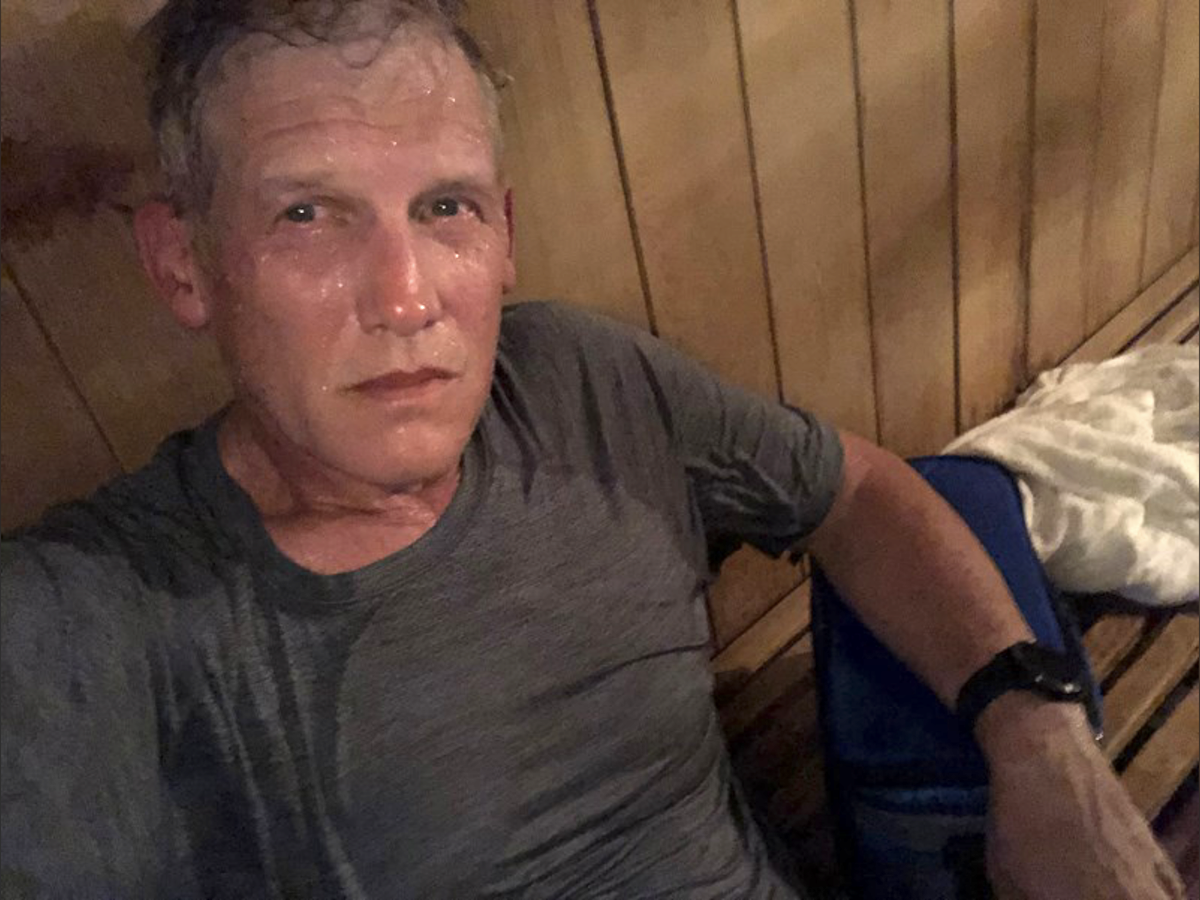
Rick Yelverton sitting in a sauna during his training for the 2021 Badwater 135. Photo courtesy of Rick Yelverton.
iRunFar: What advantage does age confer for this race?
Yelverton: I think the ability to compartmentalize things. To tolerate everything that’s coming. To stay focused for a long period of time. Patience.
iRunFar: Has anybody told you you’re too old to be doing this?
Yelverton: Yes, all the time. Everybody says, “But your knees!” I tell them this kind of thing makes your knees stronger. I have particular colleagues at work who just don’t understand this. I don’t talk too much about it… I tell them there are a lot of people a lot older than me who are doing this. I think I’m kind of mainstream. I haven’t started scratching the surface of crazy. And my hope is the longer I do it, the better I’ll get. I just have to figure out how to keep moving down the road.
iRunFar: Has racing in the heat become more difficult as you’ve gotten older?
Yelverton: I don’t think so. We’ll find out tomorrow though.
iRunFar: Why do you run?
Yelverton: I love running just to be in motion. And something like Badwater takes you to places that’d be hard to get to otherwise. There are not many things that you can do to yourself that will take you to that place inside like this. Basically, you’re trying to overcome yourself. You’re not necessarily learning about yourself. I don’t have a good answer beyond that. I just like it.
Pressing for greater introspection seemed unkind this close to the race, and we left the saloon and headed back to our hotel rooms to rest before Rick’s 8:00 p.m. start.
A couple hours before he was scheduled to start, a giant sandstorm hit. It got really bad, really fast.
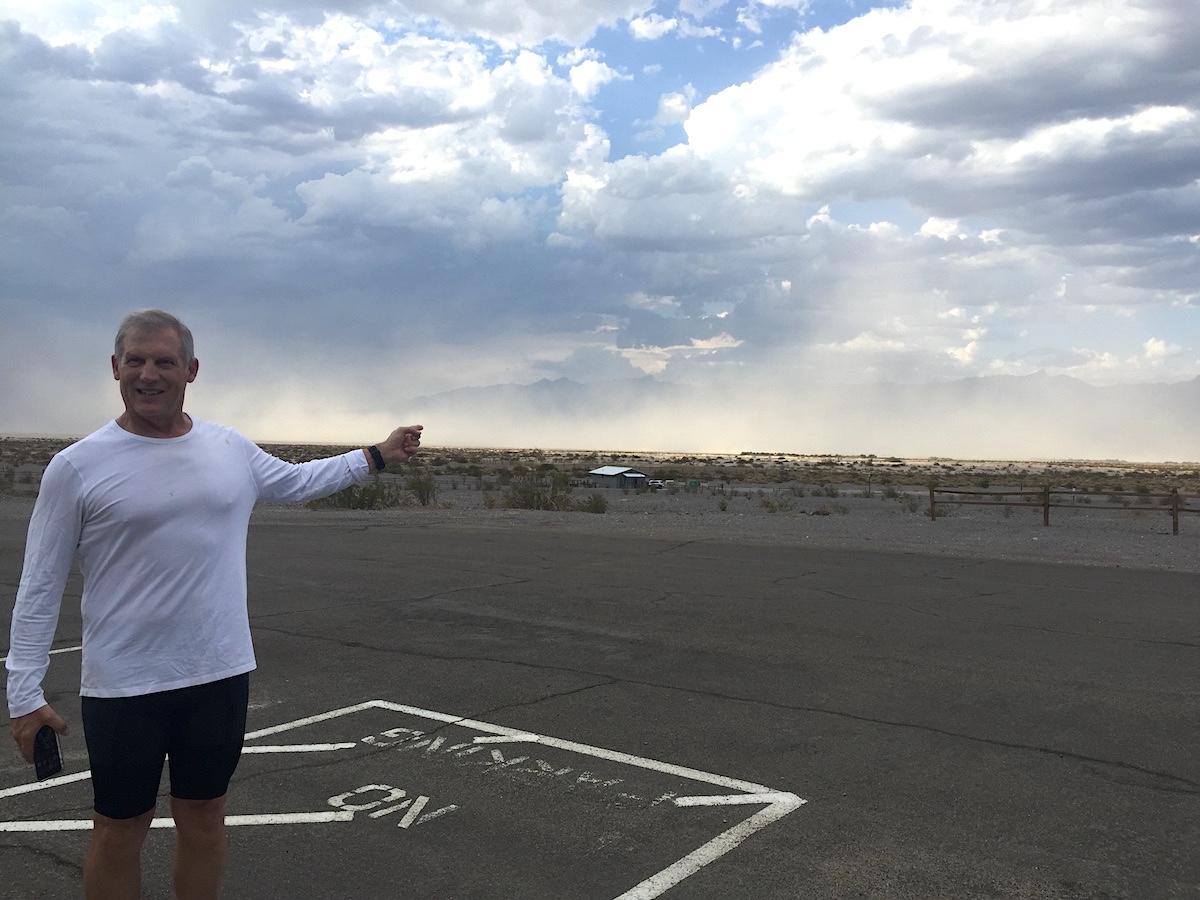
Rick Yelverton pointing to the sandstorm before the 2021 Badwater 135. All photos Liza Howard unless otherwise noted.
We were staying at Stovepipe Wells, a little developed area through which runners pass 42 miles into the race, and it looked like the storm was headed straight toward the race’s starting line. This was bad news for Rick’s lungs, which have been irritated by asthma for the past few weeks. None of the daily 90-minute sauna sessions were going to keep his lungs from pitching a hissy fit the moment he ran headfirst into sand and dust. Thankfully, by the time he lined up with the other runners at his 8:00 p.m. wave, the storm morphed into a simple headwind, and Rick arrived at Stovepipe Wells only an hour later than we expected him.
We convinced Rick it would be a good idea to take a dip in the pool before continuing into the heat of the day. The pool was lukewarm, but it seemed to provide a good reset for the next 93 miles of road running. Rick’s spandex shorts were less salty at any rate.
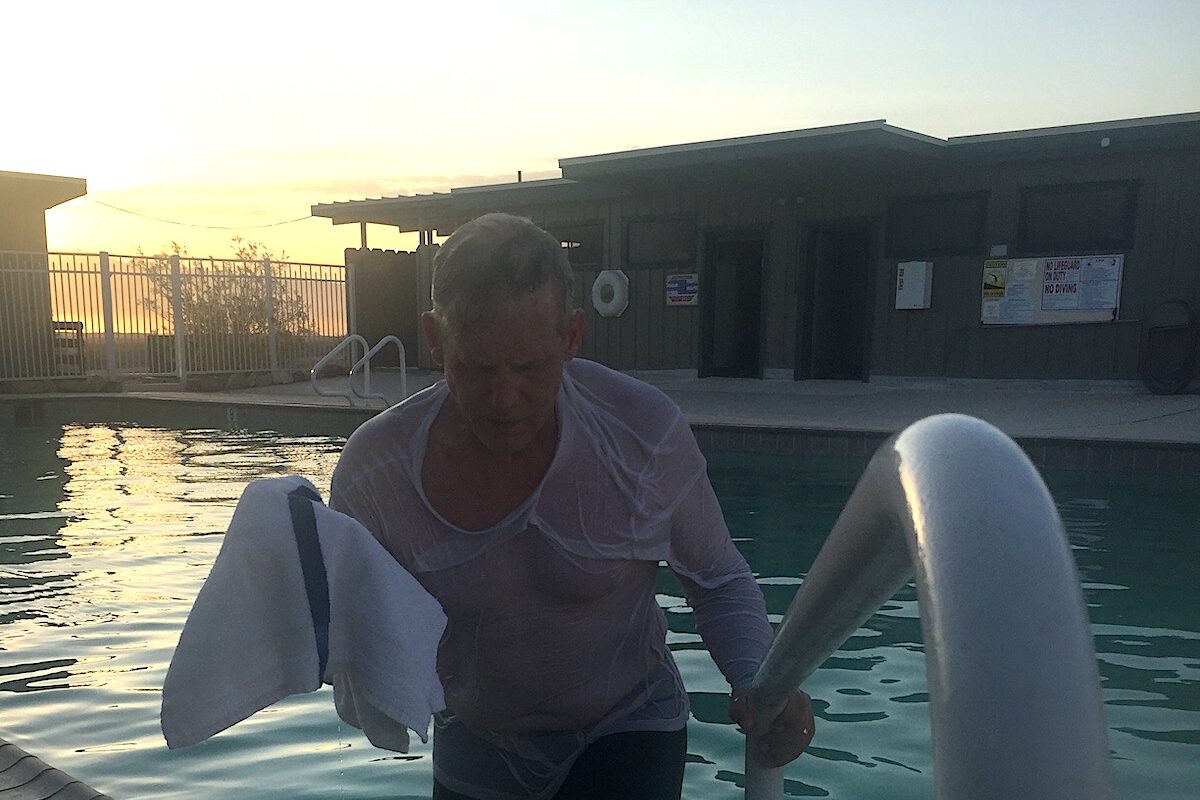
Rick taking a dip at Stovepipe Wells at mile 42 of the 2021 Badwater 135.
Rick told us the temperature at the start was 117F. Our car thermometer registered 115F the following day. This is hot. We had an ice cold can of Coke, a sparkling water, and a cup of potato chips ready for him when he arrived. Other than two bottles of Ensure and some Skratch powder early on, Rick’s 135-mile journey was pretty much fueled by Coke and chips. We saw him about every 36 minutes, and he’d either drink a 90-calorie mini-can of Coke or choke down a few chips. He also managed to eat one McDonald’s pancake breakfast the morning of the second day around mile 121.
Rick took a couple five-minute naps during the second night of the race. He sat down in a folding chair behind the minivan, closed his eyes, and fell asleep instantly, mouth open. After five minutes, we touched his shoulder and said, “Rick, time to get up,” like his mom might have when he was young. He’d open his eyes immediately and almost spring out of the chair. We decided that years of being a surgeon on call overnight was beneficial for this race.
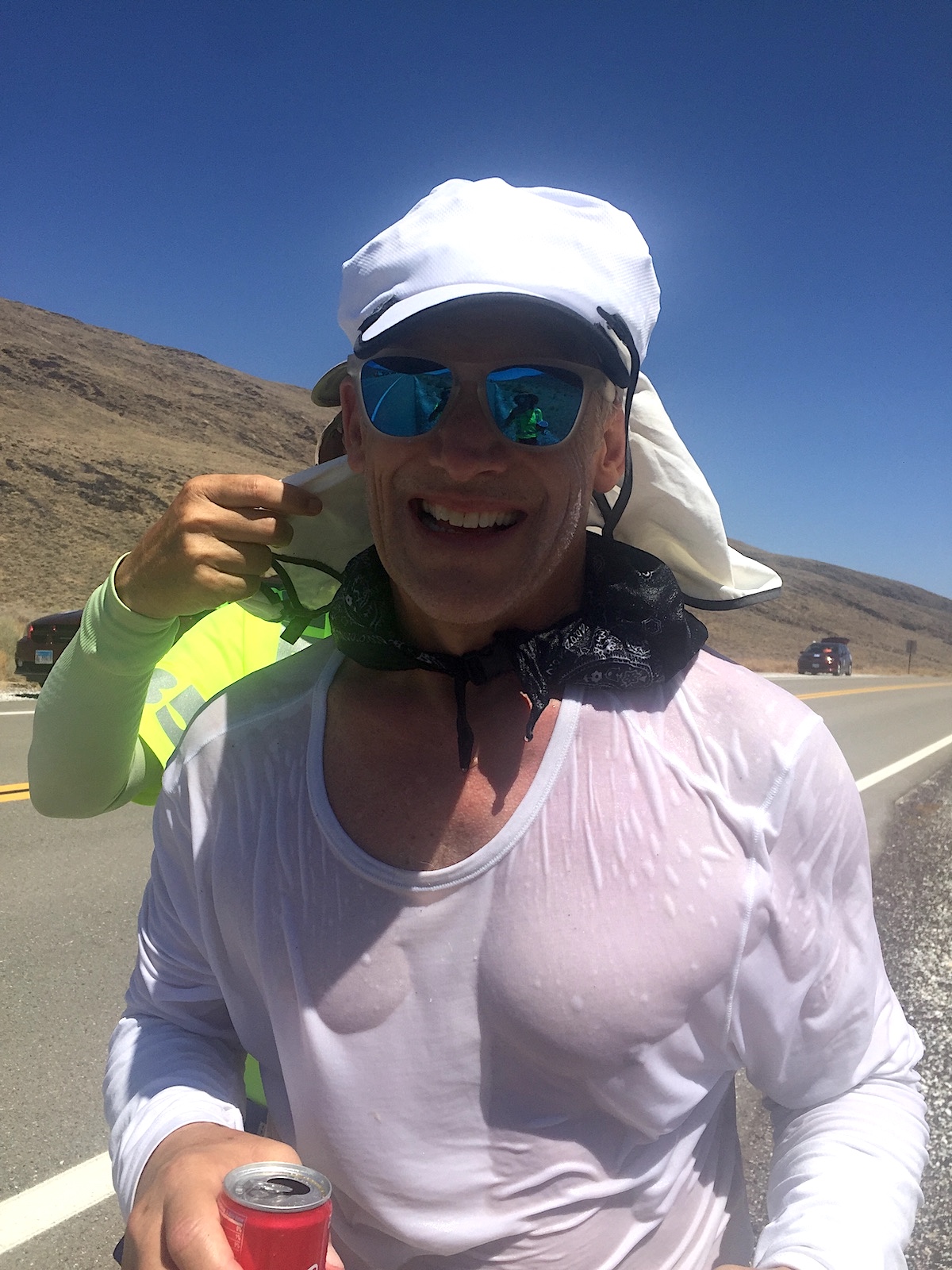
Rick on the way to completing the 2021 Badwater 135, fueled by Coke and chips.
That’s not to say Rick wasn’t affected by the lack of sleep. During the last 13 miles uphill to Mount Whitney Portal, you could hear jets flying overhead. They were above the clouds, so you couldn’t see them, but Rick kept trying. He’d stop moving, look up, and stare at the sky until he lost his balance. After the fourth time, he almost stumbled off the road, and I chided him, “Stop looking up!” He complied with good humor and continued up the mountain like a train on a schedule. In fact, Rick could not have adhered more closely to the pacing plan he’d set for himself. He was like a metronome, ticking off 18-minute miles almost every mile after Stovepipe Wells.
Throughout the race, Rick asked about Ed Ettinghausen’s progress. Rick is a huge fan of the Jester and his ultrarunning accomplishments. He’d really hoped to say hi and cheer him on. When Ed finished Badwater this year, we heard he had broken the world record for the most 100-mile races run. Unfortunately, it was hard to tell exactly where Ed was in relation to Rick due to the staggered start times. We figured he must have passed us in the night, but half a mile from the finish line, the Jester came around the corner and caught up with Rick. Rick looked like he might ascend into heaven. He reminded the Jester that they’d once met at the Javelina Jundred, and that this was his first Badwater. Ed told Rick that it would be his privilege to cross the finish line with him. A few of us got a bit teary as they walked the final distance together.
Forty hours, 15 minutes, and 16 seconds later, it was over. Rick was 44th out of 68 finishers and 84 starters. We ordered hamburgers and fries and sat down at a picnic table to celebrate… and finish his interview.
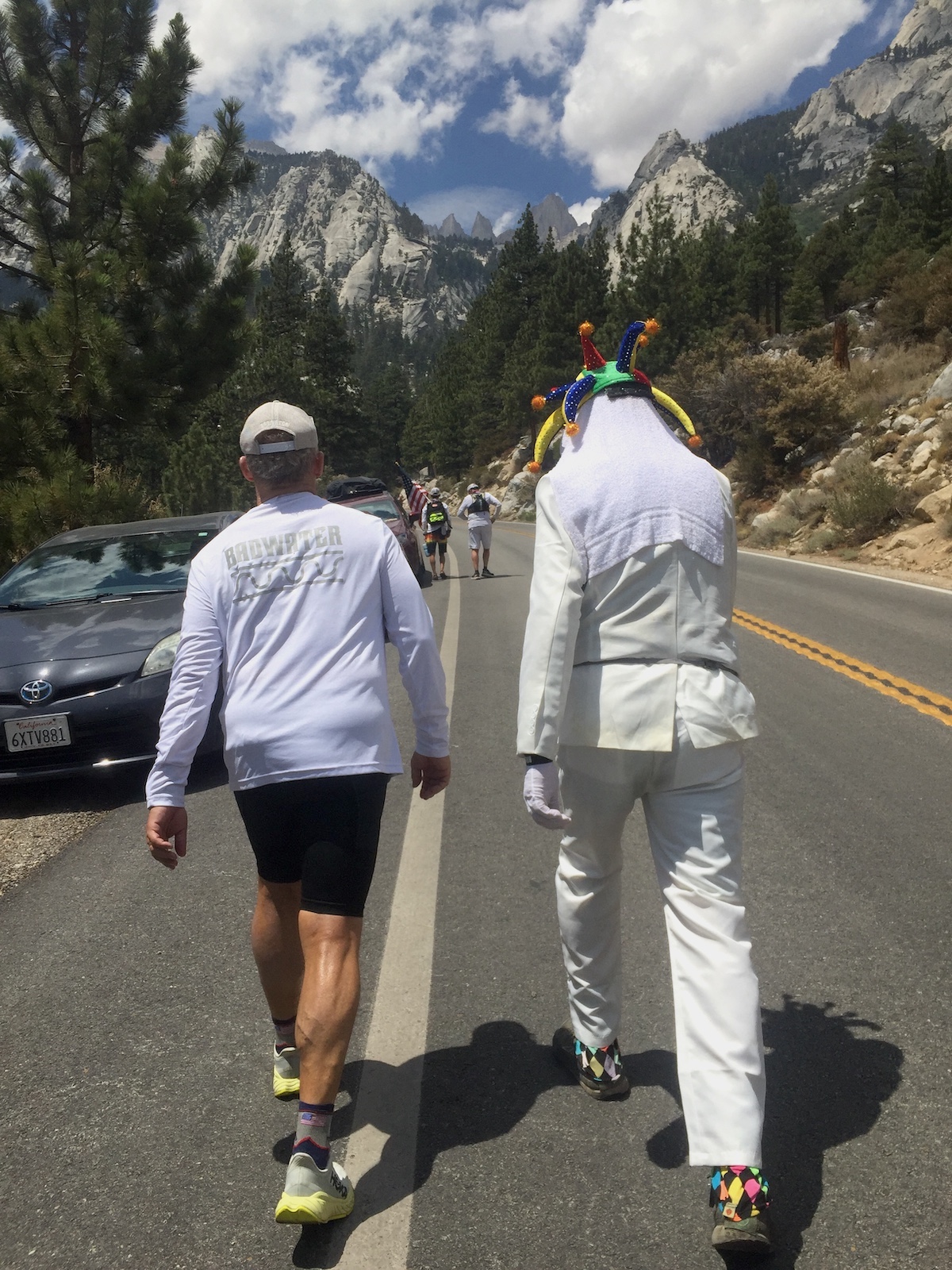
Rick and Ed Ettinghausen on the way to completing the 2021 Badwater 135.
iRunFar: What were your biggest challenges during the race?
Yelverton: Sleep deprivation. Staying awake is really uncomfortable and unpleasant. Nausea continues to plague me at all races. I’m slowly getting a better handle on it as I get more experience. I had big problems with blisters during the Keys 100 Mile in May, and this race was 35 miles longer, and hotter with lots of elevation change. Blisters weren’t crippling this time, though. [Author’s Note: Rick changed his running socks and powdered his feet every 20 to 25 miles during Badwater.]
iRunFar: What does crossing the finish line mean to you?
Yelverton: It is a huge confidence builder. It also represents another milestone in my running career full of crazy goals. My desire to run Badwater began such a long time ago, and having completed it, I feel like I just medaled in my event. The enormity of it has not hit me yet. Most of the world will never be able to really understand what happened out there in the desert. To me, it’s delicious to revel in… a journey of 15 or more years. For comparison, my journey from college to becoming a surgeon didn’t even take that long. My head is still spinning.
iRunFar: What did you learn during this race?
Yelverton: My main goal was to complete it. I was not really looking to learn anything at this point, but rather to take in the whole experience. I am hoping that I will learn more as I look back and reflect on what happened and what was accomplished. I really think I was able to stay present in the moment, probably the closest that I have come to a flow state. I had totally let go of my past and where I had come from. I was fully immersed in the process: the pain and discomfort, the heat, the joy of continued forward progress, the sheer beauty and vastness of the desert, hunger, nausea, fatigue, sleep deprivation, and the community of my crew. For more than 40 hours, my world was a tiny little sphere, with no past or future, just the present moment.
iRunFar: When will you stop running ultras?
Yelverton: When I drop dead. I want to do it as long as I can.
2021 Badwater 135 Age Group Records
The second-place female this year, just two hours and 49 minutes behind winner Sally McRae, was 62-year-old Norma Roberts. She ran 33:37:49 and set a new women’s 60-69 age-group record.
Call for Comments
Calling all Rick Yelverton stories! Leave them in the comments section.
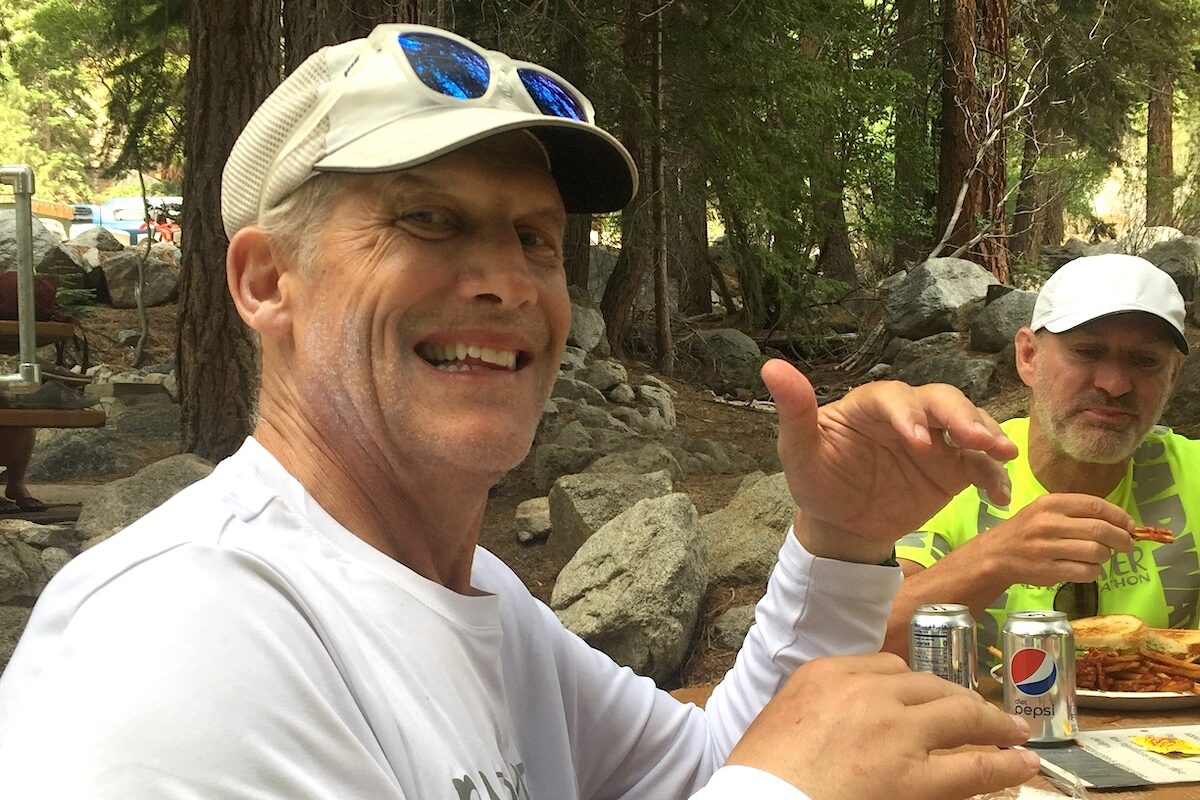
Rick eating with friends after finishing the 2021 Badwater 135.
